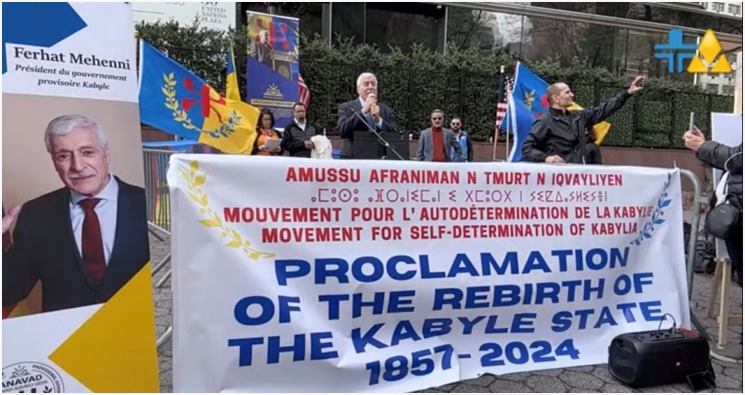Kabylia declares independence from Algeria
Participants at the proclamation in New York raised Kabyle flags and chanted the national anthem.
- Advertisement -
The Kabylia independence movement, MAK, officially declared the rebirth of the Kabyle state at a ceremony in New York, after years of peaceful struggle against Algerian occupation.
The independence proclamation took place in New York near the UN marking the ambition of the new Kabyle state to become a fully-fledged member of the international community.
- Advertisement -
In this regard the OFFICIAL JOURNAL published this Saturday, April 20, 2024, the Law proclaiming the renaissance of Kabylie State. This text of law was examined, amended and adopted during the plenary session of the Kabyle Parliament held on March 30, 2024.
- Advertisement -
The text of the Law stated that “The Kabyle State is the legitimate representative of the Kabyle people in Kabylia and throughout the world. It is the emanation of the will of all those who campaign for its advent”. “The Kabyle State is working to organize the self-determination referendum of the Kabyle people”.
Speaking to the audience, MAK chief Ferhat Mehenni recalled the history of the Kabyle state which was attached to modern-day Algeria by French colonialism.
“It was against Algerian colonialism that Kabylie revolted from 1963 to 1966,” recalled Mehenni.
Participants at the proclamation in New York raised Kabyle flags and chanted the national anthem.
Few days ago, Mehenni spoke to participants to the 23rd session of the UN Permanent Forum on Indigenous Issues. He urged the inclusion of Kabylia into the UN decolonization process.
- Advertisement -
He voiced hope that the UN’s fourth committee on decolonization will receive a Kabylia delegation to look into how to support their peaceful independence struggle.
Ferhat Mehenni deplored that over 500 peaceful pro-independence Kabylian activists are in jail on bogus charges.
Mehenni denounced that Algeria uses “terrorist means” to defend self-determination but denies the same right to the Kabyle people, who have a distinct history of sovereignty prior to French colonialism and national assets, including their own Amazigh language and traditional laws.
Kabyle population have long been repressed and stigmatized by the military regime in Algiers. While the Kabyle people were at the forefront of the struggle against French colonialism, Kabyle leaders were assassinated by a military junta that took power in the wake of independence installing a single party regime.
During Bouteflika’s rule, the regime killed 126 Kabyle protesters in the incidents of the Black Spring, when thousands took to the streets to demand recognition of their linguistic and cultural specificities and better economic development. The protests were sparked by the killing of high school student Massinisa Guermah by the Algerian gendarmerie.
Under the Chengriha-Tebboune duo, the military regime took intimidation to a terrorizing level. Kabyle activists have accused Algiers of deliberately setting fire to their region as Algerian authorities sent scores of Kabyle independence activists to jail on bogus charges including terrorism.
During the 2019 presidential elections and the ensuing constitutional referendum, turnout in the restive Kabyle region was near zero, indicating a strong rejection of the local population of Algerian rule.
- Advertisement -



